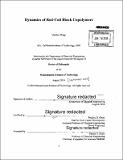| dc.contributor.advisor | Bradley D. Olsen. | en_US |
| dc.contributor.author | Wang, Muzhou, Ph. D. Massachusetts Institute of Technology | en_US |
| dc.contributor.other | Massachusetts Institute of Technology. Department of Chemical Engineering. | en_US |
| dc.date.accessioned | 2015-08-20T18:47:01Z | |
| dc.date.available | 2015-08-20T18:47:01Z | |
| dc.date.copyright | 2014 | en_US |
| dc.date.issued | 2015 | en_US |
| dc.identifier.uri | http://hdl.handle.net/1721.1/98151 | |
| dc.description | Thesis: Ph. D., Massachusetts Institute of Technology, Department of Chemical Engineering, September 2015. | en_US |
| dc.description | Cataloged from PDF version of thesis. "August, 2014." | en_US |
| dc.description | Includes bibliographical references. | en_US |
| dc.description.abstract | Polymer science is exploring advanced materials which combine functional domains such as proteins and semiconducting polymers with traditional flexible polymers in the same molecule. While thermodynamic assemblies of different geometries introduce many interesting new phenomena such as entropic packing and liquid crystalline interactions, dynamic effects are also important to understand for optimal design of material mechanics, processing kinetics, and the new physics that directly arises from the motion of multiple domains of dissimilar geometries. Rod-coil block copolymers are an example of hybrid molecules that have attracted recent interest for organic electronics and biomaterials. This thesis uses theory, simulation, and experiments to better understand the mechanisms of molecular motion in entangled rod-coil block copolymers as a model for this wider class of functional polymeric materials. The large geometrical differences between rigid rods and Gaussian coils cause significant nonlinearities in dynamical behavior as these two motifs are combined on the same molecule. It is shown that the motion of rod-coils is slowed relative to rod and coil homopolymers because of a mismatch between the curvature of the rod and coil entanglement tubes. This mismatch causes different relaxation mechanisms in the small and large rod limits, where either the rod or the coil block is expected to determine the motion of the overall molecule. In the small rod limit where the rod is a perturbation on coil motion, the randomly varying curvature of the coil's tube presents entropic barriers to the reptation of the rod, modifying the unhindered motion of the coil along its tube into an activated reptation process. In the large rod limit where the coil is a perturbation on rod motion, the long rod cannot rotate around the surrounding entanglements so motion is only possible when the coil moves into a straightened entanglement tube in an arm retraction process. These mechanisms were first explored in molecular dynamics simulation using the Kremer- Grest model of entangled polymers, which showed that the tracer diffusion of coil-rod-coil triblock copolymers was slower than both rod and coil homopolymers. This observation was verified experimentally by forced Rayleigh scattering in both the small and large rod limits. Using additional simulations and experiments, the theories were applied to more complex configurations such as diblock copolymers and self-diffusion in polymer melts, where additional effects including molecular asymmetry and the motion of the surrounding chains were incorporated. Finally, a more detailed and quantitative analysis of the mechanisms both individually and in combination was performed using a coarse-grained slip-link model which matched the previous simulations and experiments. | en_US |
| dc.description.statementofresponsibility | by Muzhou Wang. | en_US |
| dc.format.extent | 300 pages | en_US |
| dc.language.iso | eng | en_US |
| dc.publisher | Massachusetts Institute of Technology | en_US |
| dc.rights | M.I.T. theses are protected by copyright. They may be viewed from this source for any purpose, but reproduction or distribution in any format is prohibited without written permission. See provided URL for inquiries about permission. | en_US |
| dc.rights.uri | http://dspace.mit.edu/handle/1721.1/7582 | en_US |
| dc.subject | Chemical Engineering. | en_US |
| dc.title | Dynamics of rod-coil block copolymers | en_US |
| dc.type | Thesis | en_US |
| dc.description.degree | Ph. D. | en_US |
| dc.contributor.department | Massachusetts Institute of Technology. Department of Chemical Engineering | |
| dc.identifier.oclc | 915340091 | en_US |
